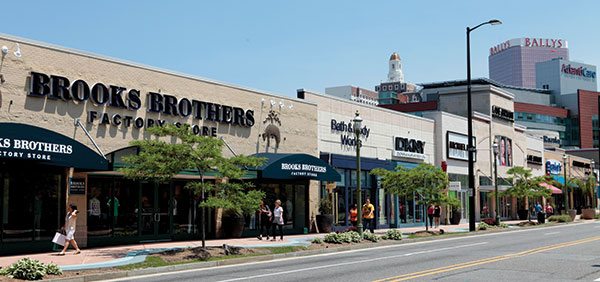Last year, Republicans and Democrats in Trenton adopted a new state law that limits future property tax hikes for Atlantic City casinos.?? Casino hotel properties no longer pay property taxes based on their value and public school and local government spending needs.? Casino properties now pay a fixed amount based on what they paid in 2015, when casino profits and values were at rock bottom. For the next nine years, they will pay yearly increases far less than what everyone else in the county will pay.? ? ??

Liberty and Prosperity, the constitutional advocacy group I represent, is challenging that law in court. We are joined by the governments of Atlantic County and six nearby towns (Absecon, Egg Harbor Twp, Hamilton Twp., Somers Point, Ventnor, Weymouth).? We claim that this law violates New Jersey?s state constitution.?? Superior Court Judge Julio Mendez heard the case last week in Atlantic City.?? It will have a big impact on every property owner in New Jersey. ?? If these casino tax breaks are permitted, similar tax breaks will soon be given to the richest and most powerful corporate business owners in every county.

When King Charles II created New Jersey ?as a British colony, his “Concession and Agreement” of 1664 required all properties to be assessed and taxed equally.?? That ?uniformity clause” has been part of our state constitution since 1844.?
After World War II, we amended that constitution several times to permit certain property tax breaks for special groups. ? We now have tax breaks for veterans, farmers, and senior citizens.? We also have tax breaks for real estate developers who improve ?blighted? areas, promote ?economic development?, or build ?affordable? housing.??
Atlantic City?s eight casino properties are assessed at roughly 50% of the town?s real estate.??? Another 11% of Atlantic City?s properties, including 110 shops and restaurants and 3,000 units of ?affordable? housing already get tax breaks.? They pay ?PILOT? which locals call ?Peanuts In Lieu Of Taxes?.?? That comes to 61%.? ?If the new law is upheld, only 39% of properties in Atlantic City will still pay regular real estate taxes based on their assessed values.
Lawyers representing state government argue that these casino tax breaks are constitutional.?? They claim that Atlantic City is ?blighted?.? They say casinos must pay less in taxes to ?revitalize? the town.?? They also claim that casinos are difficult to assess, and that taxing them at fixed amounts will bring ?stability? to Atlantic City finances by avoiding costly tax appeals.?? Finally, they claim that casinos deserve preferred treatment because they pay extra taxes to help senior citizens and worthy projects around the state.
I and lawyers for Atlantic County, and six towns in the county responded with these arguments:?
In 1987, our NJ Supreme Court knocked out a two year tax break for struggling home builders because it violated the ?uniformity? clause of our state constitution.?? This tax break for 50% of Atlantic City properties is far worse.?? Ronald Riccio, the attorney for Atlantic County and six towns argued that this 1987 State Supreme Court decision is binding precedent on the court.
While much of Atlantic City may be ?blighted?, casino hotels like the Borgata, Resorts, Harrah?s, and Tropicana are not.??? Only in a George Orwell novel could taxing luxury casino less, by raising taxes on the 39% of properties in the rest of the city be said to improve ?blighted? areas.
The new law did not bring ?stability? to Atlantic City finances. ? It did the opposite.? It is true that none of the eight casinos appealed the assessments for their 50% of Atlantic City properties this year. ? They are now making record profits and their properties are now far more valuable than when their tax obligations were determined.? No tax appeals were filed by owners of the 11% properties that previously got tax breaks.?? However, property values for the remaining 39% of Atlantic City are still in free fall.??? This year, 5,358 of those properties filed tax appeals.? This is an increase of 13% over 2016 when the ?Casino Tax Stabilization Act? was adopted.
By creating a whole new tax system, and scrapping 352 years of experience with real estate values,? the new law creates a mess of new problems.?? When real estate is taxed according to its value, it is easy to calculate each property owner?s share of the tax burden.?? A property with 5% of a town?s value pays 5% of the town?s taxes.?? A town with 11% of a county?s value pays 11% of the county?s taxes.? The new law requires all eight casino properties to pay a total of $120 million into a ?Payment In Lieu of Tax? fund, but does not determine how much each casino should pay.?? The eight casino owners are already squabbling over what each property?s share should be.? ????
There are also no rules as to how the $120 million should be divided among county and local governments, the library and public schools after it is collected.?? Atlantic County and six towns joined our lawsuit because they were promised 13.5%, but are getting only 10.2%.? State, county, and local officials readily admit they are making up the rules as they go along.?? In sorting out this mess, there are endless possibilities for confusion, litigation, politics, and even corruption.? This year, Atlantic City’s Mayor Don Guardian was up for election. ? He loyally supported Governor Christie. ? By coincidence, he was given a bigger share of the casino money this year.
The new law will systematically squeeze most non-casino hotels, shops, and restaurants in Atlantic City out of business.?? If casino hotels upgrade their properties by building new hotel rooms, shops, or restaurants, they don?t pay any additional property taxes for those improvements.?? If owners of non-casino businesses try to compete by improving properties, they are clobbered with higher assessments and more taxes.
There will be big tax hikes in Atlantic City next year, even if spending is cut to the bone.? That is because the state allowed Atlantic City to borrow heavily, rather than balance its budget last year–an election year.?? If the casino law stands, that entire debt will be paid back by just 39% of Atlantic City properties.
Finally, there is a political angle.?? The New Jersey casino law completely bans casino owners and employees from doing or saying anything that is remotely political.? (In Nevada and other states, casino owners are very active in politics.) ? Here in New Jersey, casino owners and employees cannot run for office, help candidates, or even openly speak on public issues.?? Back in the 1990?s, Donald Trump nearly lost his casino license when he opposed Senator Gormley?s plan to move Atlantic City?s convention center away from his Boardwalk hotel.?? Steve Wynn said it was easier to do business with Chinese Communists than with New Jersey politicians.?? In 2007, the owner of the Tropicana Casino got ?whacked? out of his $2 billion investment when he got on the wrong side of certain people with political influence.? 
As the ?Casino Tax Stabilization Act? relentlessly grinds down more non-casino owned business, Atlantic City will be even more like an occupied province with a colonial economy. ? Most working residents of Atlantic County will be employees of the government or of some government agency or contractor.?? Or they will be employees or tenants of some big corporate owner of a casino hotel can be put out of business any time someone in its operation offends Trenton?s political class in any way.?
??????????????? Superior Court Judge Julio Mendez heard all these arguments back and forth for more than two hours last week.?? He praised the attorneys for their preparation and research, and promised to announce his decision shortly.??


